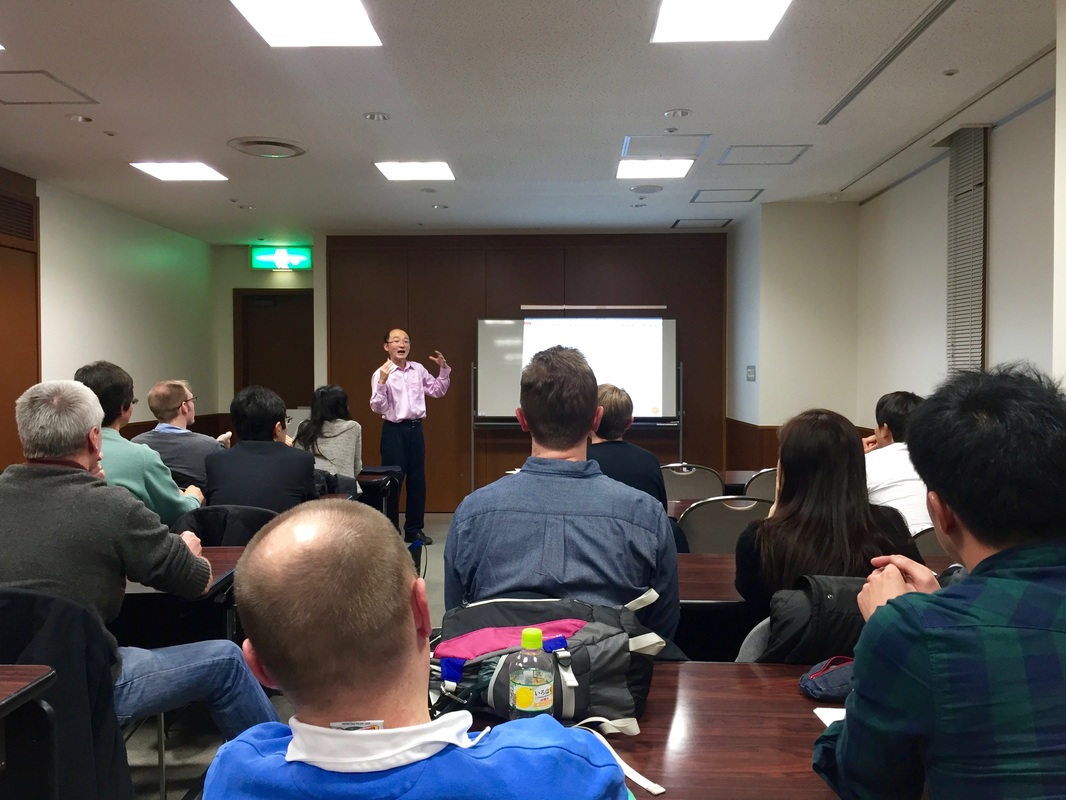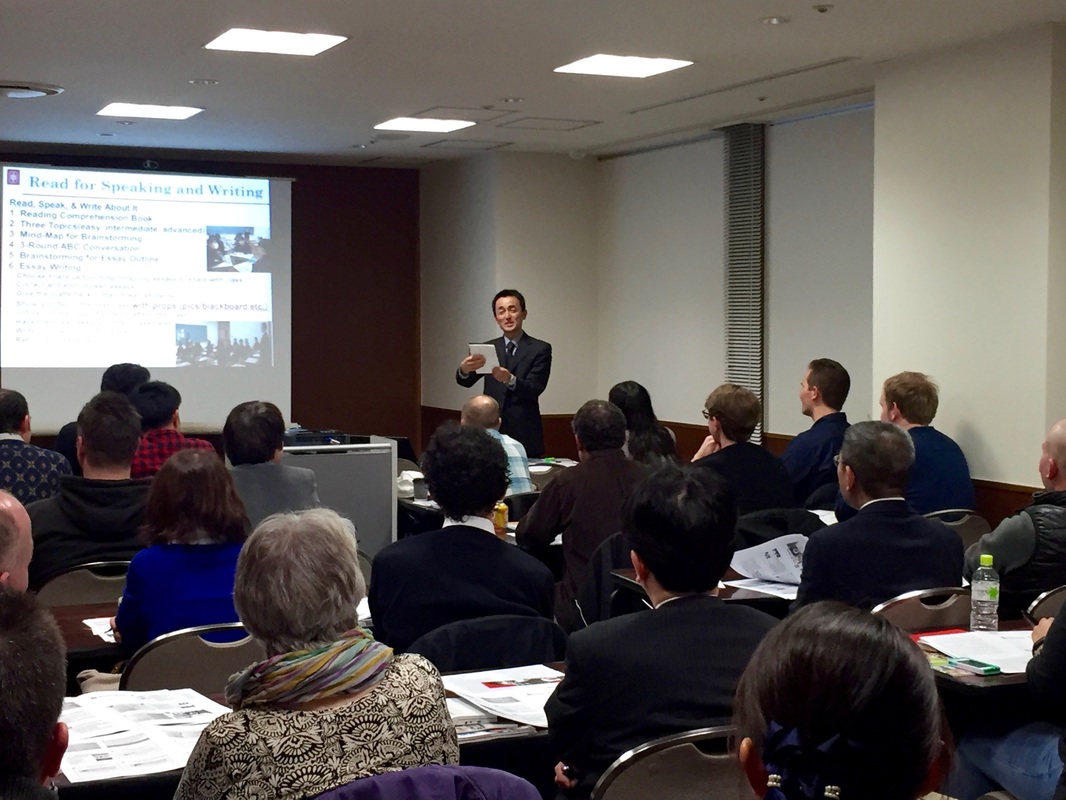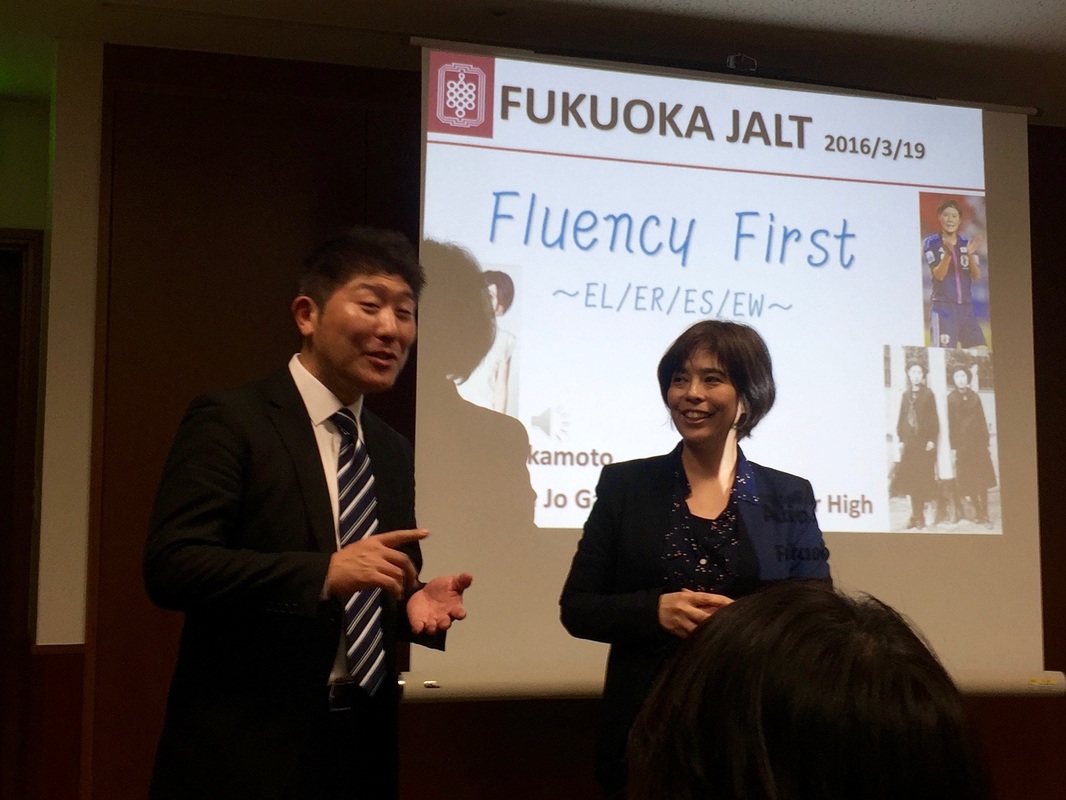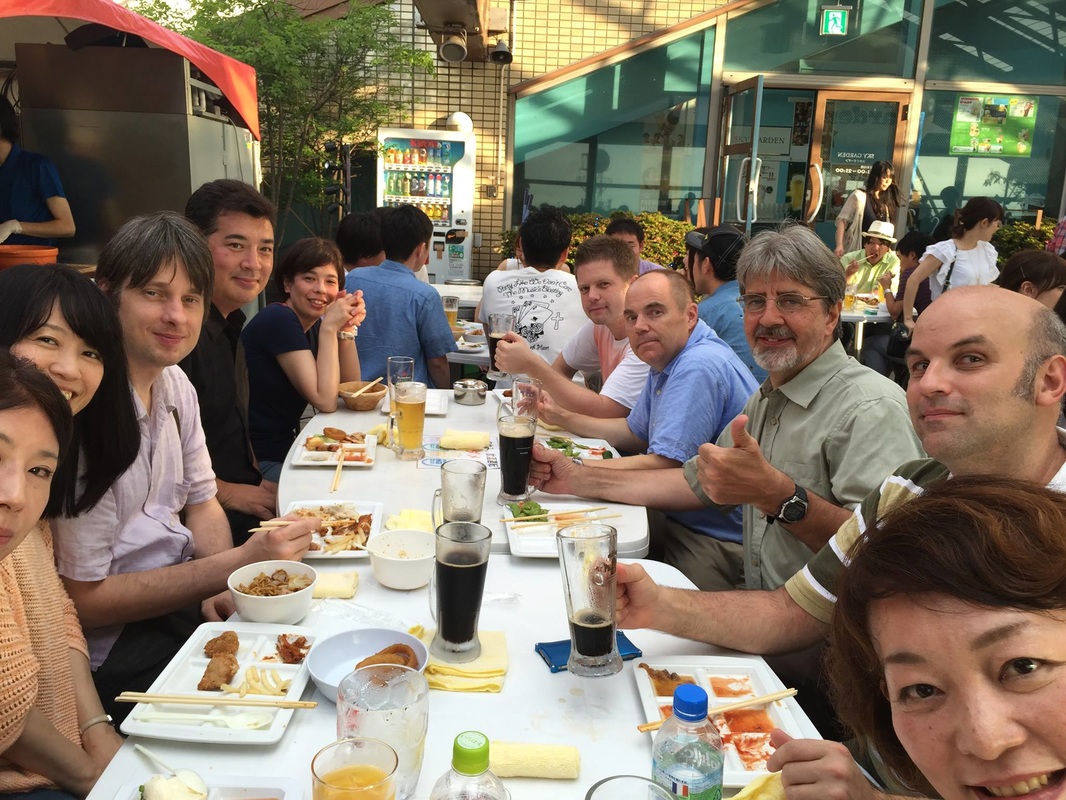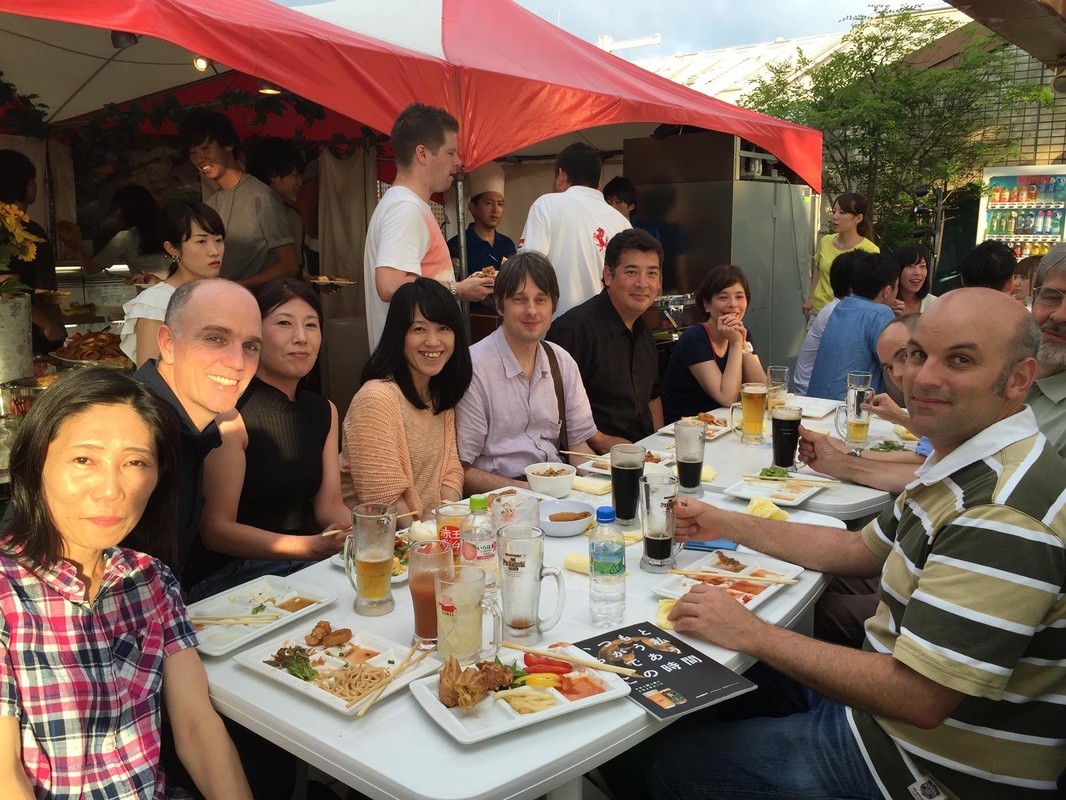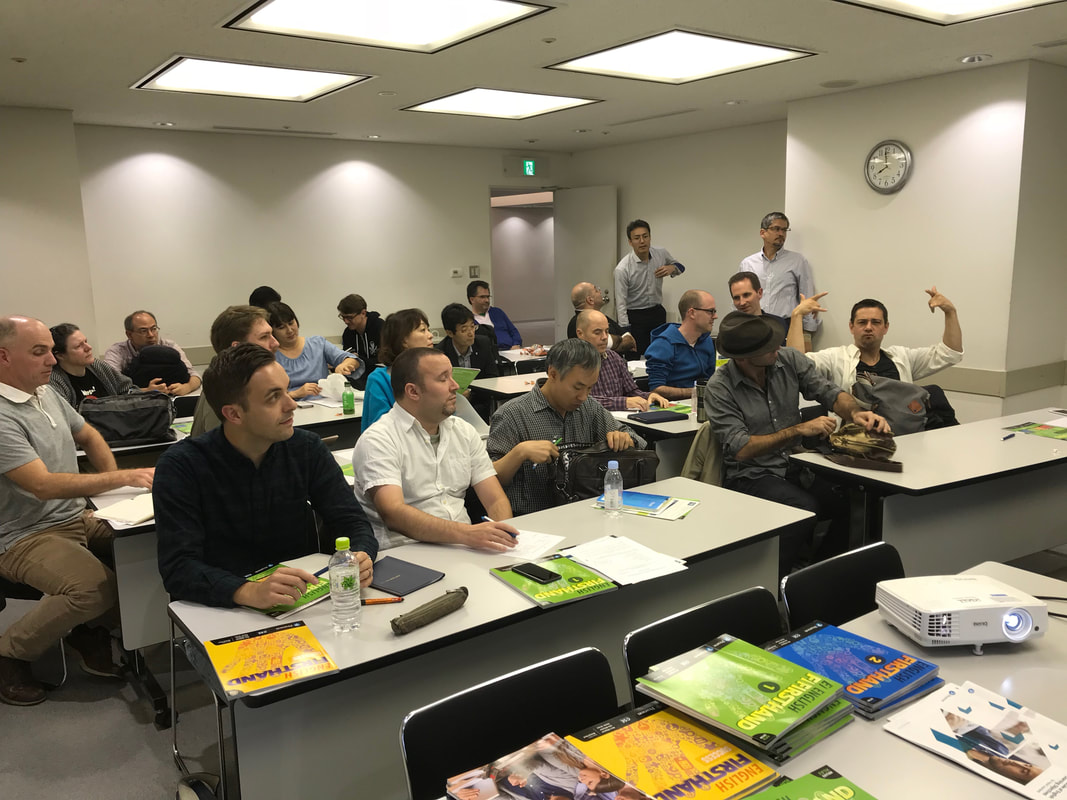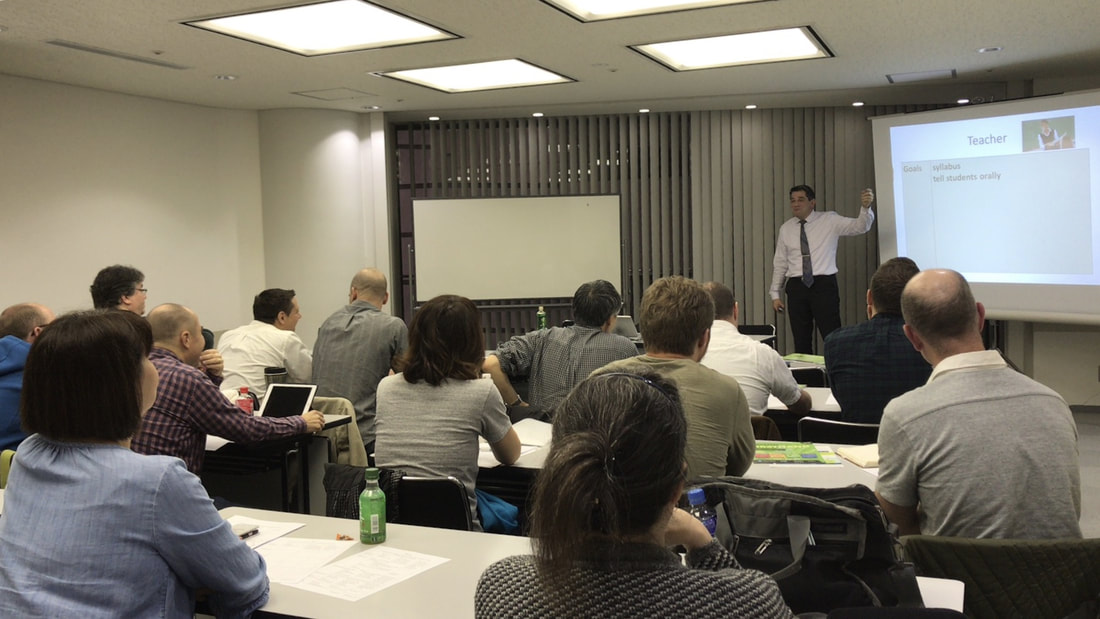January 10, 2016 (Sunday)
Inspire or Perspire? Getting Students Speaking
Speaker: Andy Boon (Toyo Gakuen University)
Venue: Seinan Community Center, 2F meeting room, Nishijin, Fukuoka City
Social: D. Kajahna (Indian)
Inspire or Perspire? Getting Students Speaking
Speaker: Andy Boon (Toyo Gakuen University)
Venue: Seinan Community Center, 2F meeting room, Nishijin, Fukuoka City
Social: D. Kajahna (Indian)
This presentation will introduce the audience to a number of strategies that can help break the silence in the Japanese classroom and get students engaging in meaningful communication. Audience members will be asked to try out a number of tried and tested speaking activities and also be encouraged to share their ideas for getting students talking to one another in the L2.
Inspire is a listening and speaking course with additional content reading designed to create a richer speaking experience. The spectacular National Geographic photos and video provide enduring images that inspire learners to discover the world in all its brilliance.
Andy Boon is an associate professor in the faculty of humanities at Toyo Gakuen University, Tokyo. He has been teaching in Japan for over 17 years. He holds a PhD in Applied Linguistics from Aston University. He has been an active member of JALT since 2004, has presented at numerous conferences, and has published several articles on teacher development, motivation, and methodology. He is also co-author of Inspire; a 3-level listening and speaking coursebook (Cengage Learning, 2013-14).
Inspire is a listening and speaking course with additional content reading designed to create a richer speaking experience. The spectacular National Geographic photos and video provide enduring images that inspire learners to discover the world in all its brilliance.
Andy Boon is an associate professor in the faculty of humanities at Toyo Gakuen University, Tokyo. He has been teaching in Japan for over 17 years. He holds a PhD in Applied Linguistics from Aston University. He has been an active member of JALT since 2004, has presented at numerous conferences, and has published several articles on teacher development, motivation, and methodology. He is also co-author of Inspire; a 3-level listening and speaking coursebook (Cengage Learning, 2013-14).
February 27, 2016 (Saturday)
Emotions in language learning: What teachers should know
Speaker: Keita Kikuchi
ACROS Fukuoka Seminar Room 1/2F
Emotions in language learning: What teachers should know
Speaker: Keita Kikuchi
ACROS Fukuoka Seminar Room 1/2F
The presenter first discusses the importance of studying emotion in second language learning. He presents what he learned in his experience researching motivation and a new study he conducted recently. In this study, a questionnaire based on Dornyei (2010) was developed to study the motivational dynamics of Japanese college students to study English as a foreign language (EFL). It consists of the Ideal L2 self, the Ought-to L2 self, and L2 learning experience. The instrument in this research also measures these constructs. This research project entails three phases. In the first phase, the questionnaire data, collected in April 2015 from more than 600 university freshmen who attend several colleges in Japan, was analyzed using both exploratory and confirmatory factor analysis. In the second phase, five learners who participated were interviewed six times over two semesters from April 2015 to January 2016. Questionnaire data was also collected from these learners, to identify their initial motivational characteristics in April, and to observe the motivational dynamics with quantitative data over two semesters. Finally, using the Geneva Emotion wheel (Scherer, Shuman, Fontaine, & Soriano, 2013), they were asked to reflect on the emotions triggered by events that affected their motivational changes that they mentioned in the six interviews at the end of the research project.
Based on the results of this study, the presenter will discuss what teachers should know about the emotions in language learning. Since participants are invited to discuss and share what they have observed on this topic throughout the presentation, active participants are welcomed.
Keita Kikuchi holds a Master of Arts degree in ESL from the University of Hawai'i at Manoa and a Doctorate in Education from Temple University. He is currently an associate professor at Kanagawa University in Yokohama, Japan. His most recent publication is “Demotivation in Second Language Acquisition: Insights from Japan (Multilingual Matters: 2015).”
Based on the results of this study, the presenter will discuss what teachers should know about the emotions in language learning. Since participants are invited to discuss and share what they have observed on this topic throughout the presentation, active participants are welcomed.
Keita Kikuchi holds a Master of Arts degree in ESL from the University of Hawai'i at Manoa and a Doctorate in Education from Temple University. He is currently an associate professor at Kanagawa University in Yokohama, Japan. His most recent publication is “Demotivation in Second Language Acquisition: Insights from Japan (Multilingual Matters: 2015).”
March 19, 2016 (Saturday)
A Fluency-First Approach: Building Students’ Motivation and Fluency
Speaker: Akio Sakamoto
A Fluency-First Approach: Building Students’ Motivation and Fluency
Speaker: Akio Sakamoto
ACROS Fukuoka Seminar Room 1/2F
Abstract: This presentation will demonstrate a “fluency-first” approach. This approach is especially suitable for students with low motivation and for those who are too afraid of making mistakes. Culturally, Japanese people are said to be afraid of making mistakes, which accuracy-focused Japanese teaching styles reinforce. The presenter will show some practical methods to break through an accuracy-only mindset to actively and comfortably push students to increases in levels of fluency and proficiency.
The presenter will demonstrate how to create a motivating learning environment where students produce both “beautiful silence” in reading and writing and “happy noise” in listening and speaking. This presentation aims to give interested teachers some ideas to encourage their students to read and listen extensively and express themselves extensively in speaking and writing.
Akio Sakamoto teaches at Fukuoka Jo Gakuin Junior and Senior High School. He has been teaching for 19 years. He has presented and given lectures at many conferences and events around Japan on his research of how to apply new and practical ideas to build fluency and proficiency. He encourages teachers and students to adopt his methods and to visit his classroom to see him in practice.
April 23, 2016 (Saturday)
Two shorter presentations:
"Increasing Gender Equality in the Classroom" Sara Hendricks
and
"Freeing up Fluency in a Silent Speaking Class" Steve Paton
6:00pm~8:00pm
ACROS Fukuoka Seminar Room 1/2F
Afterwards:Social: Morris Hippo
"Increasing Gender Equality in the Classroom"
Although Japan is a world leader in industry, economics, and education, it lags significantly in gender equality. This study conducted at a university in Japan identified viewpoints on gender roles held by 141 freshman students. It tested the ability of classroom activities and discussions to change students' stereotypical views as well as any effects male versus female instructors might have on that change. The results show that most students have a high desire for personal and societal change. Results from stereotypical testing activities showed that students with female instructors showed significantly fewer stereotypical responses throughout the semester than students with male teachers. This information can be used to guide hiring decisions, curriculum development and classroom activities as educators strive to increase gender equality.
"Freeing up Fluency in a Silent Speaking Class"
In speaking classes with English majors, I’d become disappointed that students weren’t taking advantage of the opportunity to speak, and to learn through experience. Many students were using too much Japanese, or hiding silently behind their more enthusiastic classmates.
In the second semester, I instigated a new, experimental assessment design that would reward active participation, rather than accuracy or “correctness”. More importantly, though, I gave the students a comprehensive, organized explanation of my reasoning, hoping it would change their perception of the course.
I heard more English during the next few lessons than I’d heard in the entire first semester! My explanation had really resonated, and the students opened up, apparently no longer burdened by a concern with accuracy.
In this presentation, I’ll go through what I presented to the students, discuss why I think it was so effective, and show how I’ve applied what I learned to subsequent classes.
Sara Hendricks is interested in student motivation, helping under-performing students, and gender equality. She received her Master's Degree in TESOL from the UW-River Falls and has taught English in six countries--and gotten into even more arguments as to whether Taiwan and China count as separate countries!
Steve Paton has been teaching English for eleven years; firstly to international students in Sydney, Australia, and since 2009, at universities in Fukuoka. He’s interested in learning strategies and strategies-based instruction, and is a member of the Apple Distinguished Educator program.
Two shorter presentations:
"Increasing Gender Equality in the Classroom" Sara Hendricks
and
"Freeing up Fluency in a Silent Speaking Class" Steve Paton
6:00pm~8:00pm
ACROS Fukuoka Seminar Room 1/2F
Afterwards:Social: Morris Hippo
"Increasing Gender Equality in the Classroom"
Although Japan is a world leader in industry, economics, and education, it lags significantly in gender equality. This study conducted at a university in Japan identified viewpoints on gender roles held by 141 freshman students. It tested the ability of classroom activities and discussions to change students' stereotypical views as well as any effects male versus female instructors might have on that change. The results show that most students have a high desire for personal and societal change. Results from stereotypical testing activities showed that students with female instructors showed significantly fewer stereotypical responses throughout the semester than students with male teachers. This information can be used to guide hiring decisions, curriculum development and classroom activities as educators strive to increase gender equality.
"Freeing up Fluency in a Silent Speaking Class"
In speaking classes with English majors, I’d become disappointed that students weren’t taking advantage of the opportunity to speak, and to learn through experience. Many students were using too much Japanese, or hiding silently behind their more enthusiastic classmates.
In the second semester, I instigated a new, experimental assessment design that would reward active participation, rather than accuracy or “correctness”. More importantly, though, I gave the students a comprehensive, organized explanation of my reasoning, hoping it would change their perception of the course.
I heard more English during the next few lessons than I’d heard in the entire first semester! My explanation had really resonated, and the students opened up, apparently no longer burdened by a concern with accuracy.
In this presentation, I’ll go through what I presented to the students, discuss why I think it was so effective, and show how I’ve applied what I learned to subsequent classes.
Sara Hendricks is interested in student motivation, helping under-performing students, and gender equality. She received her Master's Degree in TESOL from the UW-River Falls and has taught English in six countries--and gotten into even more arguments as to whether Taiwan and China count as separate countries!
Steve Paton has been teaching English for eleven years; firstly to international students in Sydney, Australia, and since 2009, at universities in Fukuoka. He’s interested in learning strategies and strategies-based instruction, and is a member of the Apple Distinguished Educator program.
| gender_roles_lesson_plans.pdf |
May 28, 2016 (Saturday)
Students' Voices Regarding The Use Of Technology In And Out Of The Classroom
Suzy Connor (Nagasaki University)
May 28, Saturday 6:00-8:00 PM
Venue: ACROS Fukuoka Seminar Room 2 / 2F
1-1-1 Tenjin, Chuo-ku, Fukuoka City
In addition to traditional methods of study, the new technology greatly expands the possibilities in and out of the classroom in terms of teaching, homework and independent study. Teachers often share how they use the new technologies with each other, but what do the students think? Students at mid-level and high-level universities were surveyed via 2 separate essays about what they liked and disliked about various types of technology in the classroom, and their favorite ways to study on their own. Regarding studying on their own, it was pointed out to them that this does not include the assigned e-learning unless they liked it enough to continue using it. When reflecting on teaching practices, taking into account the students' concerns and opinions can help teachers plan a more effective classroom.
Biography: Suzy works full time at Nagasaki University and part time at Kurume University School of Nursing. Research interests include Medical English, TOEIC/TOEFL, and of course, using Harry Potter in any way possible in those 2 areas!
Students' Voices Regarding The Use Of Technology In And Out Of The Classroom
Suzy Connor (Nagasaki University)
May 28, Saturday 6:00-8:00 PM
Venue: ACROS Fukuoka Seminar Room 2 / 2F
1-1-1 Tenjin, Chuo-ku, Fukuoka City
In addition to traditional methods of study, the new technology greatly expands the possibilities in and out of the classroom in terms of teaching, homework and independent study. Teachers often share how they use the new technologies with each other, but what do the students think? Students at mid-level and high-level universities were surveyed via 2 separate essays about what they liked and disliked about various types of technology in the classroom, and their favorite ways to study on their own. Regarding studying on their own, it was pointed out to them that this does not include the assigned e-learning unless they liked it enough to continue using it. When reflecting on teaching practices, taking into account the students' concerns and opinions can help teachers plan a more effective classroom.
Biography: Suzy works full time at Nagasaki University and part time at Kurume University School of Nursing. Research interests include Medical English, TOEIC/TOEFL, and of course, using Harry Potter in any way possible in those 2 areas!
Saturday June 25th 2-5pm, & Sunday 26th, 2016, 10am-2pm.
The Evolution of Business Language Training in Japan
Featured Presenters: Michael Handford, Andrew Vaughan & Hiromasa Tanaka
Venue: ACROS Fukuoka Seminar Room 2, 2nd Floor
The aim of this event is to throw light on the various ways that Business English is being learned, taught and used in workplaces in Japan.
Drawn together will be corporate, academic and private business English teachers and researchers to discuss current teaching practices and the evolution of this field.
Biography: Featured Presenters: Michael Handford, Andrew Vaughan & Hiromasa Tanaka
Professor Mike Handford is from Cardiff University and will present via video presentation. He is planning on using data and examples from construction industry meetings, and is the co-author of the corpus based Business Advantage textbook. Andrew Vaughan is the GM of a company which customizes language/communication skills programs for Japanese and foreign-owned companies. He has a wealth of knowledge and experience about how the Japanese corporate language training field has evolved, and will bring his interests in testing and evaluation to show the return on investment in language programs. He is also the author of Get Ready for Business. Professor Hiromasa Tanaka from Meisei University has published 78 articles and books on business discourse and human resource development. He took time out before his Association of Business Communication in Cape Town presentation earlier this year to give a fascinating interview to the Business Communication SIG newsletter earlier this year (accessible from our website). So we are honored that he has time to come and discuss the impacts of corporate language change with us in Fukuoka.
http://jalt.org/bizcom/index.html
The Evolution of Business Language Training in Japan
Featured Presenters: Michael Handford, Andrew Vaughan & Hiromasa Tanaka
Venue: ACROS Fukuoka Seminar Room 2, 2nd Floor
The aim of this event is to throw light on the various ways that Business English is being learned, taught and used in workplaces in Japan.
Drawn together will be corporate, academic and private business English teachers and researchers to discuss current teaching practices and the evolution of this field.
Biography: Featured Presenters: Michael Handford, Andrew Vaughan & Hiromasa Tanaka
Professor Mike Handford is from Cardiff University and will present via video presentation. He is planning on using data and examples from construction industry meetings, and is the co-author of the corpus based Business Advantage textbook. Andrew Vaughan is the GM of a company which customizes language/communication skills programs for Japanese and foreign-owned companies. He has a wealth of knowledge and experience about how the Japanese corporate language training field has evolved, and will bring his interests in testing and evaluation to show the return on investment in language programs. He is also the author of Get Ready for Business. Professor Hiromasa Tanaka from Meisei University has published 78 articles and books on business discourse and human resource development. He took time out before his Association of Business Communication in Cape Town presentation earlier this year to give a fascinating interview to the Business Communication SIG newsletter earlier this year (accessible from our website). So we are honored that he has time to come and discuss the impacts of corporate language change with us in Fukuoka.
http://jalt.org/bizcom/index.html
July 9, 2016 (Saturday)
Language Learning and Listening:
Reducing Anxiety, Improving Ability and Assessing Difficulty
Adam Murray
Venue: Hummingbird (Shigematsu bldg. #302) (Click here for our maps page)
Abstract: In the first part, I will talk about the impact of anxiety on foreign language learning. I personally became interested in this area of research from my experiences learning and using Japanese. Although the majority of anxiety-related research focuses on speaking, my research is on foreign language listening anxiety. I conducted a medium-sized study with 176 undergraduate students who were enrolled in compulsory EFL classes for non-English majors at four universities. In this talk, I will talk about the design of the study in both practical and theoretical terms. I will also describe the relationship between listening anxiety and performance on the one-way listening tasks based on the listening section of the TOEIC test. Finally, I will conclude with some ideas for dealing with listening anxiety in the classroom.
In the second part, I will demonstrate a listening website that I have been making for an ongoing KAKEN-funded project. Listening materials were collected from a number of sources to ensure that a variety of text types (e.g. problem-solution, discussion, interview, telephone message, news report etc.) of varying levels of difficulty. I will share preliminary results and give practical suggestions for those who are considering setting up a similar system for their students.
Biography: Adam Murray is an experienced educator who is currently teaching at Miyazaki International College. For almost a decade, Adam has been teaching English as a Foreign Language to Japanese university students. His research interests are listening instruction, materials development, and assessment. His currently the coordinator of the JALT Materials Writers Special Interest Group. He can be reached at [email protected].
Social: 2016 BEER GARDEN
IMS 14 F Beer and Highball Sky Garden
Language Learning and Listening:
Reducing Anxiety, Improving Ability and Assessing Difficulty
Adam Murray
Venue: Hummingbird (Shigematsu bldg. #302) (Click here for our maps page)
Abstract: In the first part, I will talk about the impact of anxiety on foreign language learning. I personally became interested in this area of research from my experiences learning and using Japanese. Although the majority of anxiety-related research focuses on speaking, my research is on foreign language listening anxiety. I conducted a medium-sized study with 176 undergraduate students who were enrolled in compulsory EFL classes for non-English majors at four universities. In this talk, I will talk about the design of the study in both practical and theoretical terms. I will also describe the relationship between listening anxiety and performance on the one-way listening tasks based on the listening section of the TOEIC test. Finally, I will conclude with some ideas for dealing with listening anxiety in the classroom.
In the second part, I will demonstrate a listening website that I have been making for an ongoing KAKEN-funded project. Listening materials were collected from a number of sources to ensure that a variety of text types (e.g. problem-solution, discussion, interview, telephone message, news report etc.) of varying levels of difficulty. I will share preliminary results and give practical suggestions for those who are considering setting up a similar system for their students.
Biography: Adam Murray is an experienced educator who is currently teaching at Miyazaki International College. For almost a decade, Adam has been teaching English as a Foreign Language to Japanese university students. His research interests are listening instruction, materials development, and assessment. His currently the coordinator of the JALT Materials Writers Special Interest Group. He can be reached at [email protected].
Social: 2016 BEER GARDEN
IMS 14 F Beer and Highball Sky Garden
August 27, 2016 (Saturday)
Towards a Comprehensive Understanding of EFL Team Teaching in Japan
Takaaki Hiratsuka
August 27, 6:00-8:00, ACROS Fukuoka Seminar Room 1 (2nd Floor) Locations
Social:
Grand China , ACROS Fukuoka B1 : 20:00-22:00
Abstract:
Part 1: Focusing on teachers: Eliminating the false dichotomy between native and non-native English speaking teachers
By enhancing the understanding of particular aspects of native English speaking teachers (NESTs) and non-native English speaking teachers (NNESTs), teachers and students can come to make better sense, both linguistically and culturally, of their own experiences in language teaching and learning. In Japan, there has recently been a growing interest in teachers' and students' perceptions of local Japanese teachers of English (JTEs) who are NNESTs and foreign assistant language teachers (ALTs) who are NESTs hired through almost 30 years of the JET program. This study included JTEs, ALTs and their students, thereby adding valuable insights to the discussion of N/NESTs and team teaching in Japan. Data were collected using multiple qualitative methods at two public high schools in order to examine the perceptions of JTEs and ALTs. Findings suggest that political, cultural and educational contexts, as well as the teachers' traits as N/NESTs, crucially affected the participants' perceptions. In conclusion, I discuss the importance of eliminating the false dichotomy between NESTs and NNESTs and provide implications for language teachers, students, teacher educators and policy makers.
Part 2: Focusing on practices: Unpacking team teachers' and students' perceptions of team-teaching practices
In this study I explored the perceptions of JTEs, ALTs and their students of team-teaching practices. Data were collected from two pairs of team teachers and four of their students in two high schools via a myriad of qualitative methods, including interviews, pair discussions and focus group discussions. Findings suggest that the participants considered team-teaching practices to be: unique, because of the participation of a native English speaker in the team, and also because of the particular nature of teamwork by both teachers; open-ended, due to vague definitions; and less important than other commitments at school. The complex perceptions derived from the participants' personal experiences, contextual factors and research conditions.
Biography: Takaaki Hiratsuka is an Associate Professor at University of the Ryukyus. He received his PhD from University of Auckland, New Zealand. His research and teaching interests lie in the areas of teacher education, teacher research and qualitative research methods.
Towards a Comprehensive Understanding of EFL Team Teaching in Japan
Takaaki Hiratsuka
August 27, 6:00-8:00, ACROS Fukuoka Seminar Room 1 (2nd Floor) Locations
Social:
Grand China , ACROS Fukuoka B1 : 20:00-22:00
Abstract:
Part 1: Focusing on teachers: Eliminating the false dichotomy between native and non-native English speaking teachers
By enhancing the understanding of particular aspects of native English speaking teachers (NESTs) and non-native English speaking teachers (NNESTs), teachers and students can come to make better sense, both linguistically and culturally, of their own experiences in language teaching and learning. In Japan, there has recently been a growing interest in teachers' and students' perceptions of local Japanese teachers of English (JTEs) who are NNESTs and foreign assistant language teachers (ALTs) who are NESTs hired through almost 30 years of the JET program. This study included JTEs, ALTs and their students, thereby adding valuable insights to the discussion of N/NESTs and team teaching in Japan. Data were collected using multiple qualitative methods at two public high schools in order to examine the perceptions of JTEs and ALTs. Findings suggest that political, cultural and educational contexts, as well as the teachers' traits as N/NESTs, crucially affected the participants' perceptions. In conclusion, I discuss the importance of eliminating the false dichotomy between NESTs and NNESTs and provide implications for language teachers, students, teacher educators and policy makers.
Part 2: Focusing on practices: Unpacking team teachers' and students' perceptions of team-teaching practices
In this study I explored the perceptions of JTEs, ALTs and their students of team-teaching practices. Data were collected from two pairs of team teachers and four of their students in two high schools via a myriad of qualitative methods, including interviews, pair discussions and focus group discussions. Findings suggest that the participants considered team-teaching practices to be: unique, because of the participation of a native English speaker in the team, and also because of the particular nature of teamwork by both teachers; open-ended, due to vague definitions; and less important than other commitments at school. The complex perceptions derived from the participants' personal experiences, contextual factors and research conditions.
Biography: Takaaki Hiratsuka is an Associate Professor at University of the Ryukyus. He received his PhD from University of Auckland, New Zealand. His research and teaching interests lie in the areas of teacher education, teacher research and qualitative research methods.
September 10, 2016 (Saturday)
Creating Supplementary Materials for Reading Classes
Trevor Holster
September 10, 18:00-20:00, ACROS Fukuoka Seminar Room 1 (2nd Floor)
Social: GRAND CHINA (Chinese buffet)
Reading is a complex process that integrates numerous sub-skills, ranging from lower-order decoding skills to higher-order skills that integrate context and background knowledge into the comprehension process. Although reading instruction must aim to develop proficiency in higher-order skills, learners must automatize lower-order skills before they can access higher-order skills. I will briefly argue that commercial reading textbooks often neglect lower-order skills so it is important for classroom teachers to create supplementary tasks that address their students' needs. I will spend most of the presentation time demonstrating how to create simple supplementary reading tasks using typical word-processing software and other free or inexpensive tools available from the internet. The emphasis will be on "low-floor, high-ceiling" tasks that benefit low-proficiency learners through intensive mechanical practice, but provide higher-proficiency learners with extensive practice necessary to develop reading fluency.
Biography: Trevor Holster is a language instructor at Fukuoka University and is the Publication Chair of the JALT Testing and Evaluation SIG. He has taught English in Japan since 1996. His current research focus is on measuring the difficulty of extensive reading materials. Other research interests include vocabulary acquisition and testing, peer assessment, and speaking assessment.
Creating Supplementary Materials for Reading Classes
Trevor Holster
September 10, 18:00-20:00, ACROS Fukuoka Seminar Room 1 (2nd Floor)
Social: GRAND CHINA (Chinese buffet)
Reading is a complex process that integrates numerous sub-skills, ranging from lower-order decoding skills to higher-order skills that integrate context and background knowledge into the comprehension process. Although reading instruction must aim to develop proficiency in higher-order skills, learners must automatize lower-order skills before they can access higher-order skills. I will briefly argue that commercial reading textbooks often neglect lower-order skills so it is important for classroom teachers to create supplementary tasks that address their students' needs. I will spend most of the presentation time demonstrating how to create simple supplementary reading tasks using typical word-processing software and other free or inexpensive tools available from the internet. The emphasis will be on "low-floor, high-ceiling" tasks that benefit low-proficiency learners through intensive mechanical practice, but provide higher-proficiency learners with extensive practice necessary to develop reading fluency.
Biography: Trevor Holster is a language instructor at Fukuoka University and is the Publication Chair of the JALT Testing and Evaluation SIG. He has taught English in Japan since 1996. His current research focus is on measuring the difficulty of extensive reading materials. Other research interests include vocabulary acquisition and testing, peer assessment, and speaking assessment.
October 15, 2016 (Saturday)
Behavioral Economics for Your Classroom
Arthur Rutson-Griffiths
October 15, 18:00-20:00, ACROS Fukuoka Seminar Room 1 (2nd Floor) Locations
Social: Grand China
Behavioural economics is the study of how psychological, social, cognitive, and emotional factors affect decision making. Despite its name, many of the findings uncovered in this emerging field have many practical benefits in the classroom. Just a few small changes and additions to everyday classroom activities can provide an extrinsic motivational boost that can increase engagement with the target language and in turn increase students' intrinsic motivation. This presentation will cover a number of findings from behavioural economics research, while relating each one to a number of techniques and tips the presenter has used and that teachers can use in the classroom to motivate their students. The ideas introduced can be used with students of any age and in almost any classroom context. The audience will be invited to share their own ideas and tips and to think of how they can incorporate some of the motivational techniques introduced into their current classroom routines.
Biography: Arthur Rutson-Griffiths is Assistant Director of the Bunkyo English Communication Centre at Hiroshima Bunkyo Women's University. He has been teaching English for six years, mostly in Japan.
Behavioral Economics for Your Classroom
Arthur Rutson-Griffiths
October 15, 18:00-20:00, ACROS Fukuoka Seminar Room 1 (2nd Floor) Locations
Social: Grand China
Behavioural economics is the study of how psychological, social, cognitive, and emotional factors affect decision making. Despite its name, many of the findings uncovered in this emerging field have many practical benefits in the classroom. Just a few small changes and additions to everyday classroom activities can provide an extrinsic motivational boost that can increase engagement with the target language and in turn increase students' intrinsic motivation. This presentation will cover a number of findings from behavioural economics research, while relating each one to a number of techniques and tips the presenter has used and that teachers can use in the classroom to motivate their students. The ideas introduced can be used with students of any age and in almost any classroom context. The audience will be invited to share their own ideas and tips and to think of how they can incorporate some of the motivational techniques introduced into their current classroom routines.
Biography: Arthur Rutson-Griffiths is Assistant Director of the Bunkyo English Communication Centre at Hiroshima Bunkyo Women's University. He has been teaching English for six years, mostly in Japan.
December 3, 2016 (Saturday)
Academic Writing Special: Scaffolding the Writing Process
Speaker: Dorothy Zemach
Four Corners Speaker Tour, and Fukuoka JALT’s OGM (Ordinary General Meeting)
ACROS Fukuoka Seminar Room 1 (2nd Floor) access
18:00-20:00.
Social:
Grand China (ACROSS Fukuoka B2)
Abstract: Do your students (or you!) regard "process writing" as a remedial technique designed for struggling writers or low-level language students? This workshop takes participants through all stages of the writing process: brainstorming, organizing, drafting, editing, and rewriting, to demonstrate its usefulness and efficiency for any level of young adult or adult writer (including native speaker). We'll try out a variety of practical and enjoyable classroom activities for each stage. Participants will look at activities that teach students to brainstorm creatively, make outlining easier for visually oriented learners, and set up a peer reviewing process that actually works.
Dorothy Zemach holds an MA in TEFL and has been teaching English for 30 years. Since turning to materials writing, she has penned everything from the Teddy Bear's Magic Music teacher's book to the lowest and highest levels of Macmillan's flagship course Open Mind to the groundbreaking English for Scammers (self-published).
December 10, 2016 (Saturday)
Self-Directed Learner Training for English Language Learning
Speaker: Mathew Porter
December 10, 15:00-17:00
ACROS Fukuoka Seminar Room 2 (2nd Floor) access
Abstract: Language is a tool for communication, and identifying what you want to do with language can provide a path for improving language ability. However, students often describe their language learning goals using vague or generic language that makes it hard for them to achieve tangible results. In the first half of this two-part presentation, I will explain goal-setting in relation to self-directed language learning and introduce some activities for analyzing needs and setting goals. In the second half of the presentation, I will discuss two projects that illustrate considerations teachers must make to support students in their selection of materials for achieving goals. The presentation will conclude with some observations about the challenges of explicitly instructing students in self-directed learning.
Biography: Mathew Porter is currently Assistant Professor of English at Fukuoka Jo Gakuin Nursing University. He spent three years as a language learning advisor at a university self-access center and is the co-coordinator of the Learner Development SIG. He is interested in collaborative learning and reflection.
Self-Directed Learner Training for English Language Learning
Speaker: Mathew Porter
December 10, 15:00-17:00
ACROS Fukuoka Seminar Room 2 (2nd Floor) access
Abstract: Language is a tool for communication, and identifying what you want to do with language can provide a path for improving language ability. However, students often describe their language learning goals using vague or generic language that makes it hard for them to achieve tangible results. In the first half of this two-part presentation, I will explain goal-setting in relation to self-directed language learning and introduce some activities for analyzing needs and setting goals. In the second half of the presentation, I will discuss two projects that illustrate considerations teachers must make to support students in their selection of materials for achieving goals. The presentation will conclude with some observations about the challenges of explicitly instructing students in self-directed learning.
Biography: Mathew Porter is currently Assistant Professor of English at Fukuoka Jo Gakuin Nursing University. He spent three years as a language learning advisor at a university self-access center and is the co-coordinator of the Learner Development SIG. He is interested in collaborative learning and reflection.


